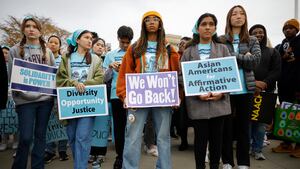The U.S. Supreme Court ruled against Harvard and the University of North Carolina’s policies of considering race as a factor in college admissions on Thursday—a landmark decision that will upend affirmative action policies throughout the nation.
The decision is the latest to come from the court’s 6-3 conservative majority, with Chief Justice John Roberts writing that the court believes the race-conscious admissions policies violate the Fourteenth Amendment’s Equal Protection Clause.
“The student must be treated based on his or her experiences as an individual—not on the basis of race,” Roberts wrote. “Many universities have for too long done just the opposite.”
Colleges nationwide will now be barred from considering race in admissions, a blow that will require institutions to find new ways to maintain diversity.
The decision comes seven years after the court upheld an affirmative action program at the University of Texas. At the time, the court wrote that the promotion of diversity in education justified the consideration of race as a factor in admission decisions.
The ruling was rendered moot on Thursday, however, with Justice Sonia Sotomayor being the only remaining justice on the court from the 2016 ruling. Even then, the ruling in favor of affirmative action passed with a slim 4-3 majority.
Thursday’s ruling came after a group headed by Edward Blum, a conservative who’s long fought against affirmative action, filed a lawsuit claiming a group of Asian and white students were discriminated against at UNC. Blum claimed Black, Hispanic and Native American applicants were given preferential treatment by admissions despite having inferior accolades.
Harvard was roped into a separate but concurrent case for allegedly discriminating against Asian Americans, with opponents claiming the university set subjective standards to limit the number of Asian students being admitted.
Ketanji Brown Jackson, the first Black woman to serve on the court, recused herself from the Harvard ruling but in her dissent to the UNC ruling, she grilled her fellow justices for their decision, writing “our country has never been so colorblind.”
“With let-them-eat-cake obliviousness, today, the majority pulls the ripcord and announces ‘colorblindness for all’ by legal fiat,” she wrote. “But deeming race irrelevant in law does not make it so in life.”
In her dissent, Sotomayor blasted the court’s majority for concluding that “indifference to race is the only constitutionally permissible means” to achieve racial equality in admissions.
“That interpretation of the Fourteenth Amendment is not only contrary to precedent and the entire teachings of our history... but it is also grounded in the illusion that racial inequality was a problem of a different generation,” she wrote. “Entrenched racial inequality remains a reality today... Ignoring race will not equalize a society that is racially unequal.”
Thursday’s ruling was made by the most diverse Supreme Court in U.S. history, which is made up of four white men, two white women, one Black man, one Black woman, and a Hispanic woman. In an interview with MSNBC, Derrick Johnson, president of the NAACP, took aim at Justice Clarence Thomas for siding against affirmative action.
“The worst thing about affirmative action is that it created a Clarence Thomas who benefited from the program,” Johnson said. “And now he’s in a position where he is going to deny many young African Americans, talent individuals, an opportunity.”








